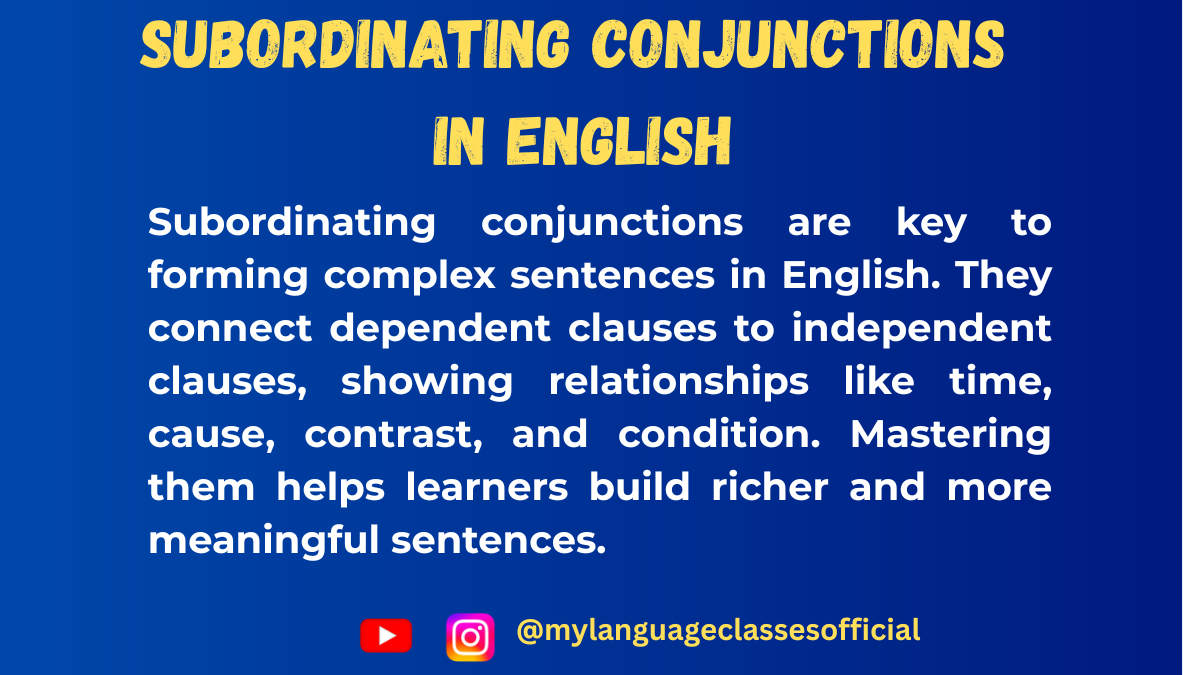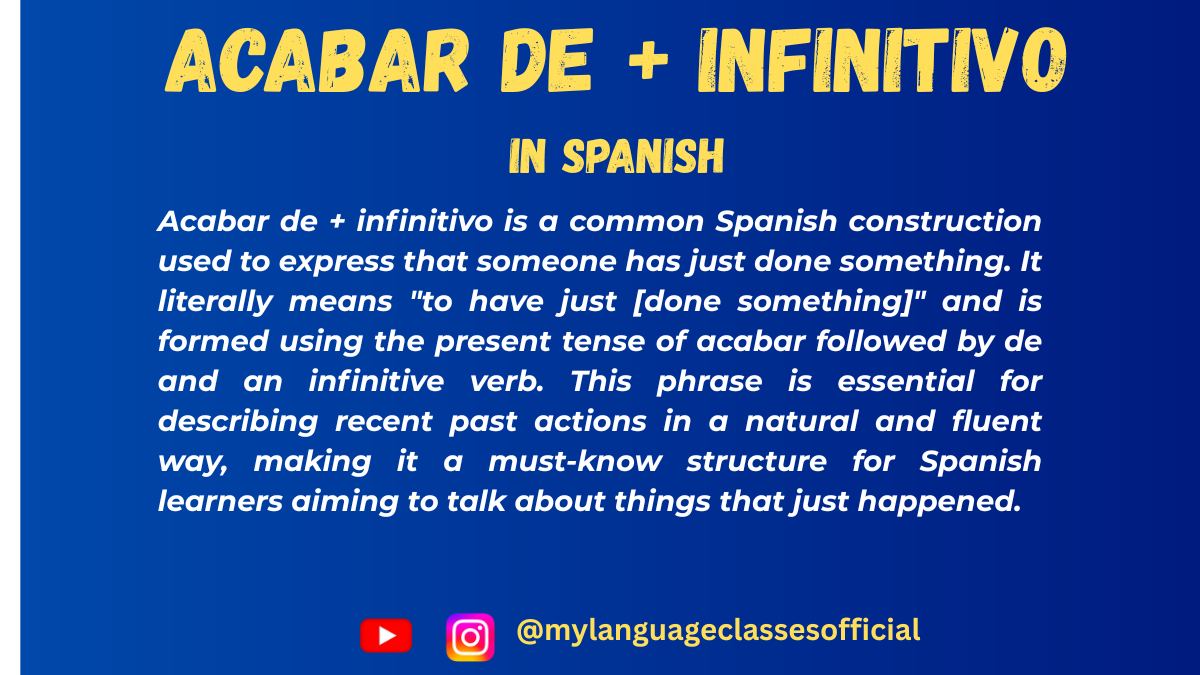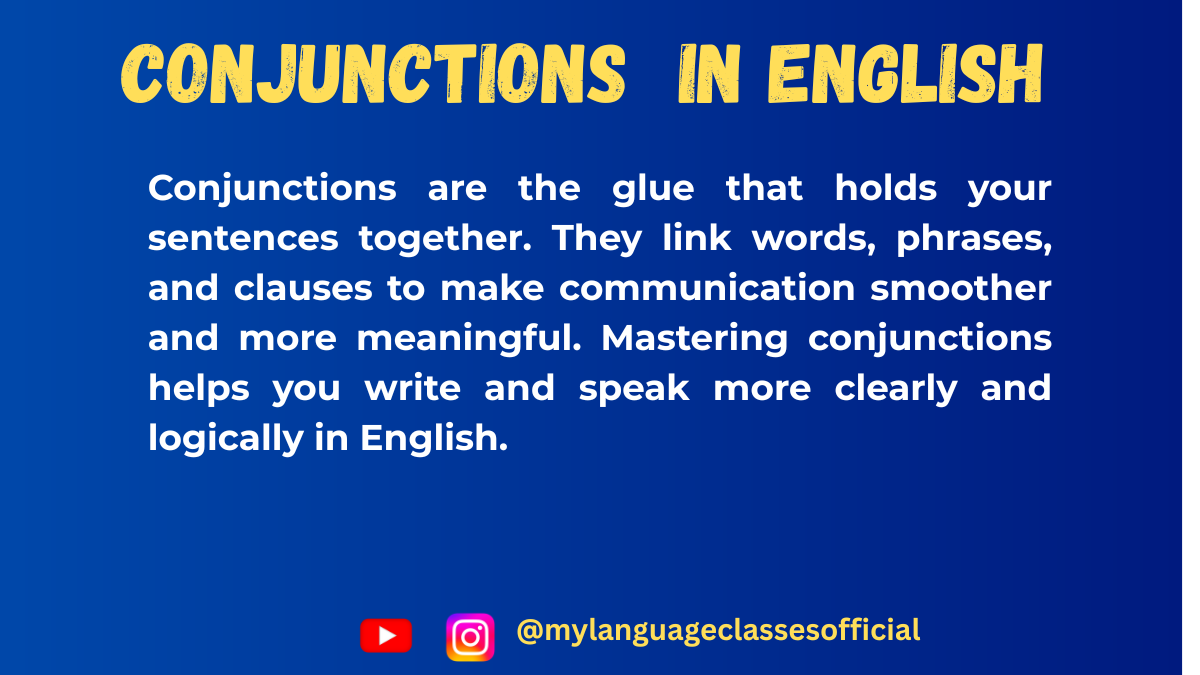Your cart is currently empty!
Tag: daily prompt
-
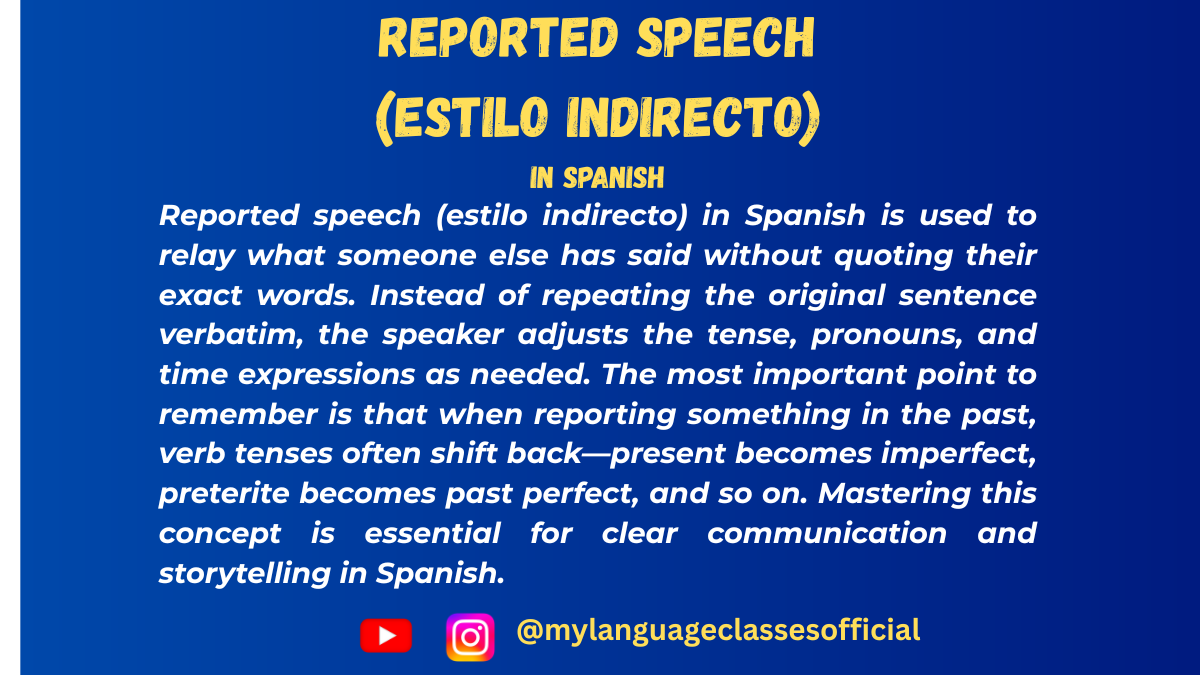
Reported Speech (Estilo Indirecto) in Spanish
Reported speech, or estilo indirecto, is a fundamental aspect of Spanish grammar that allows us to relay what someone else has said without quoting their exact words. It is used in both formal and informal contexts, making it an essential skill for effective communication in Spanish. Whether you’re recounting a conversation, sharing news, or summarizing someone’s thoughts, mastering estilo indirecto will significantly enhance your fluency.
In this blog post, we’ll explore everything you need to know about estilo indirecto, including common expressions, conjugation rules, irregular verbs, and practical examples. By the end, you’ll have a solid understanding of how to use reported speech confidently in Spanish.
Common Expressions Using Estilo Indirecto
Here’s a list of common expressions used in daily life with estilo indirecto. These phrases are frequently used to report speech or thoughts:
- Dijo que… – He/She said that…
- Me preguntó si… – He/She asked me if…
- Quería saber si… – He/She wanted to know if…
- Explicó que… – He/She explained that…
- Comentó que… – He/She commented that…
- Aseguró que… – He/She assured that…
- Negó que… – He/She denied that…
- Prometió que… – He/She promised that…
- Sugirió que… – He/She suggested that…
- Advirtió que… – He/She warned that…
These expressions are often followed by a verb in the indicative or subjunctive mood, depending on the context.
Things to Keep in Mind
When using estilo indirecto, there are several key points to remember:
- Verb Tense Changes: The tense of the verb in the original statement often changes in reported speech. For example, present tense may shift to imperfect, and preterite may shift to pluperfect.
- Pronoun Adjustments: Pronouns often change to reflect the new perspective. For example, yo (I) may become él/ella (he/she).
- Time and Place References: Words like hoy (today) may change to aquel día (that day) in reported speech.
- Use of Que: The word que (that) is frequently used to introduce reported speech.
- Subjunctive Mood: If the original statement expresses doubt, uncertainty, or a recommendation, the subjunctive mood is used in estilo indirecto.
- Gender and Number Agreement: Ensure that adjectives and articles agree in gender and number with the nouns they modify.
When to Use Estilo Indirecto
Estilo indirecto is used in the following situations:
- Reporting Statements: To relay what someone has said.
- Example: Juan dijo que tenía hambre. (Juan said he was hungry.)
- Reporting Questions: To report questions asked by someone.
- Example: Me preguntó si quería café. (He asked me if I wanted coffee.)
- Reporting Commands or Requests: To relay instructions or requests.
- Example: Ella me pidió que cerrara la puerta. (She asked me to close the door.)
- Reporting Thoughts or Feelings: To share someone’s thoughts or emotions.
- Example: Pensé que no vendrías. (I thought you wouldn’t come.)
Conjugation
Regular Verbs
In estilo indirecto, regular verbs follow the same conjugation rules as in direct speech. However, the tense may change depending on the context. Here’s how to conjugate regular verbs in the three main categories:
- -AR Verbs (e.g., hablar)
- Present: habla → Imperfect: hablaba
- Preterite: habló → Pluperfect: había hablado
- -ER Verbs (e.g., comer)
- Present: come → Imperfect: comía
- Preterite: comió → Pluperfect: había comido
- -IR Verbs (e.g., vivir)
- Present: vive → Imperfect: vivía
- Preterite: vivió → Pluperfect: había vivido
Irregular Verbs
Irregular verbs in estilo indirecto follow the same conjugation patterns as in direct speech, but their forms must be memorized. Here are some common irregular verbs and their conjugations:
- Ser (to be)
- Present: es → Imperfect: era
- Preterite: fue → Pluperfect: había sido
- Ir (to go)
- Present: va → Imperfect: iba
- Preterite: fue → Pluperfect: había ido
- Decir (to say)
- Present: dice → Imperfect: decía
- Preterite: dijo → Pluperfect: había dicho
- Hacer (to do/make)
- Present: hace → Imperfect: hacía
- Preterite: hizo → Pluperfect: había hecho
- Tener (to have)
- Present: tiene → Imperfect: tenía
- Preterite: tuvo → Pluperfect: había tenido
List of common Verbs in Estilo Indirecto
Verb Estilo Indirecto Form Example Sentence 1 Example Sentence 2 Meaning Hablar hablaba Dijo que hablaba con su madre. Ella comentó que hablaba español. He said he was talking to his mom. / She mentioned she spoke Spanish. Comer comía Me dijo que comía pizza. Ellos aseguraron que comían saludable. He told me he was eating pizza. / They assured they ate healthy. Vivir vivía Explicó que vivía en Madrid. Pensé que vivías cerca. He explained he lived in Madrid. / I thought you lived nearby. Ser era Dijo que era médico. Creí que era tarde. He said he was a doctor. / I thought it was late. Ir iba Me preguntó si iba al cine. Ella dijo que iba a llamarte. He asked me if I was going to the cinema. / She said she was going to call you. Decir dijo Juan dijo que no vendría. Ellos dijeron que tenían prisa. Juan said he wouldn’t come. / They said they were in a hurry. Hacer hizo Aseguró que hizo la tarea. Pensé que hacías ejercicio. He assured he did the homework. / I thought you were exercising. Tener tenía Me dijo que tenía sueño. Creí que tenías razón. He told me he was sleepy. / I thought you were right. Poder podía Dijo que podía ayudarme. Ellos comentaron que podían venir. He said he could help me. / They mentioned they could come. Querer quería Me preguntó si quería café. Ella dijo que quería viajar. He asked me if I wanted coffee. / She said she wanted to travel.
More Example Sentences
- Dijo que no podía venir a la fiesta. (He said he couldn’t come to the party.)
- Me preguntó si había terminado el proyecto. (He asked me if I had finished the project.)
- Ella aseguró que sabía la respuesta. (She assured she knew the answer.)
- Explicó que no tenía tiempo. (He explained he didn’t have time.)
- Comentó que le gustaba el café. (He mentioned he liked coffee.)
- Advirtió que llovería mañana. (He warned it would rain tomorrow.)
- Prometió que llamaría más tarde. (He promised he would call later.)
- Negó que hubiera robado el dinero. (He denied he had stolen the money.)
- Sugirió que fuéramos al parque. (He suggested we go to the park.)
- Quería saber si habías visto la película. (He wanted to know if you had seen the movie.)
Fill in the Blanks
- Ella _____ que no _____ tiempo. (decir, tener)
- Me _____ si _____ al cine. (preguntar, ir)
- Dijo que _____ la tarea. (hacer)
- Nos _____ que _____ temprano. (pedir, llegar)
- Creí que _____ en casa. (estar)
- Explicó que no _____ la respuesta. (saber)
- Ellos _____ que _____ a la fiesta. (decir, venir)
- Pensé que _____ más tarde. (llamar)
- Aseguró que _____ el libro. (leer)
- Me _____ si _____ ayuda. (preguntar, necesitar)
Answers:
- dijo, tenía
- preguntó, iba
- había hecho
- pidió, llegáramos
- estabas
- sabía
- dijeron, vendrían
- llamarías
- había leído
- preguntó, necesitaba
Conclusion
Mastering estilo indirecto is a crucial step toward achieving fluency in Spanish. By understanding the rules of conjugation, recognizing common expressions, and practicing with real-life examples, you’ll be able to report speech accurately and naturally. Remember to pay attention to verb tense changes, pronoun adjustments, and the use of the subjunctive mood when necessary. With consistent practice, you’ll soon find yourself using estilo indirecto with confidence in everyday conversations.
¡Buena suerte! (Good luck!)
If you enjoyed this lesson, be sure to check out more posts like this on my blog at My Language Classes. Don’t forget to subscribe my YouTube channel and follow me on Instagram for the latest language learning tips and lessons. Leave a comment below to share your thoughts, or ask any questions you have about nouns.
Happy learning! 😊
- 100 Spanish Example Sentences
- 100 Spanish Fill-in-the-Blanks Exercises
- 100 Spanish Vocabulary Lists
- Spanish – Advanced
- Spanish – Beginner
- Spanish – Intermediate
-
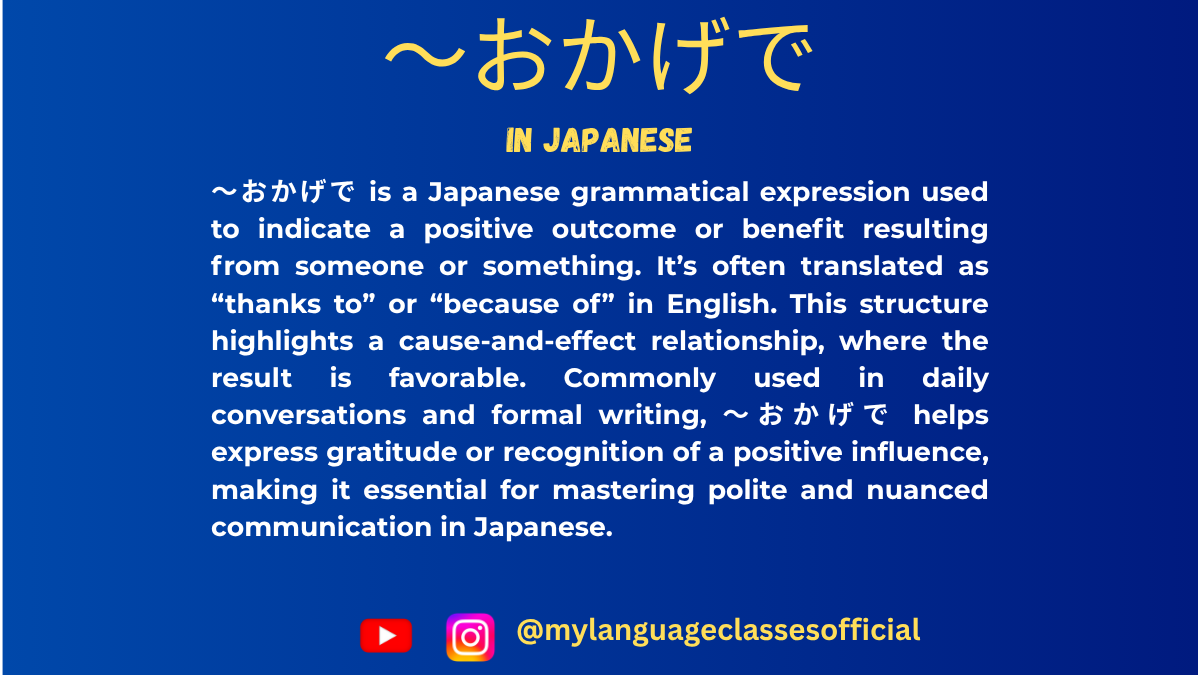
Understanding 〜おかげで in Japanese | My Language Classes
Understanding 〜おかげで
In Japanese, 〜おかげで (okage de) is a grammar point used to express gratitude or acknowledgment for a positive outcome that resulted from someone’s help, effort, or a specific situation. It translates to “thanks to,” “because of,” or “due to” in English. While it is often used in positive contexts, it can also be used sarcastically to imply a negative outcome. Understanding how to use 〜おかげで correctly is essential for expressing cause and effect in Japanese, especially when giving credit or showing appreciation.
Formation of 〜おかげで
The 〜おかげで structure can be formed with verbs, nouns, and adjectives. Here’s how it works:
1. With Verbs
- Verb (plain past tense) + おかげで
Example:
勉強したおかげで (benkyou shita okage de) – Thanks to studying
2. With Nouns
- Noun + の + おかげで
Example:
先生のおかげで (sensei no okage de) – Thanks to the teacher
3. With Adjectives
- い-Adjective (plain past tense) + おかげで
Example:
楽しかったおかげで (tanoshikatta okage de) – Thanks to it being fun - な-Adjective + だった + おかげで
Example:
静かだったおかげで (shizuka datta okage de) – Thanks to it being quiet
Usage of 〜おかげで
〜おかげで is used in various situations to express gratitude or acknowledge the cause of a positive outcome. Here are some common scenarios:
- Expressing Gratitude: Thanking someone for their help or effort.
Example: あなたのおかげで成功しました。 (Anata no okage de seikou shimashita.) – Thanks to you, I succeeded. - Acknowledging a Situation: Recognizing a situation that led to a positive result.
Example: いい天気のおかげでピクニックが楽しめました。 (Ii tenki no okage de pikunikku ga tanoshimemashita.) – Thanks to the good weather, we enjoyed the picnic. - Sarcastic Usage: Implying a negative outcome (often used humorously or ironically).
Example: あなたのおかげで遅刻しました。 (Anata no okage de chikoku shimashita.) – Thanks to you, I was late.
List of Verbs, Nouns, and Adjectives with 〜おかげで Form
Word Type Word 〜おかげで Form Example Sentence (Japanese) Romaji Version English Meaning Verb 勉強する (study) 勉強したおかげで 勉強したおかげで合格した。 Benkyou shita okage de goukaku shita. Thanks to studying, I passed the exam. Verb 頑張る (work hard) 頑張ったおかげで 頑張ったおかげで成功した。 Ganbatta okage de seikou shita. Thanks to working hard, I succeeded. Noun 先生 (teacher) 先生のおかげで 先生のおかげで日本語が上手になった。 Sensei no okage de nihongo ga jouzu ni natta. Thanks to the teacher, my Japanese improved. Noun 友達 (friend) 友達のおかげで 友達のおかげで楽しかった。 Tomodachi no okage de tanoshikatta. Thanks to my friend, it was fun. い-Adjective 楽しい (fun) 楽しかったおかげで 楽しかったおかげで元気になった。 Tanoshikatta okage de genki ni natta. Thanks to it being fun, I felt energized. い-Adjective 早い (early) 早かったおかげで 早かったおかげで間に合った。 Hayakatta okage de maniatta. Thanks to being early, I made it on time. な-Adjective 静か (quiet) 静かだったおかげで 静かだったおかげで集中できた。 Shizuka datta okage de shuuchuu dekita. Thanks to it being quiet, I could focus. な-Adjective 便利 (convenient) 便利だったおかげで 便利だったおかげで時間が節約できた。 Benri datta okage de jikan ga setsuyaku dekita. Thanks to it being convenient, I saved time.
More Example Sentences
- 友達のおかげで新しい仕事を見つけました。
Tomodachi no okage de atarashii shigoto o mitsukemashita.
Thanks to my friend, I found a new job. - 雨のおかげで庭の花がきれいに咲きました。
Ame no okage de niwa no hana ga kirei ni sakimashita.
Thanks to the rain, the flowers in the garden bloomed beautifully. - 彼のアドバイスのおかげで問題が解決しました。
Kare no adobaisu no okage de mondai ga kaiketsu shimashita.
Thanks to his advice, the problem was solved. - 勉強したおかげで試験に合格しました。
Benkyou shita okage de shiken ni goukaku shimashita.
Thanks to studying, I passed the exam. - 先生のおかげで日本語が上手になりました。
Sensei no okage de nihongo ga jouzu ni narimashita.
Thanks to the teacher, my Japanese improved. - 早く起きたおかげで朝ごはんを食べられました。
Hayaku okita okage de asagohan o taberaremashita.
Thanks to waking up early, I could eat breakfast. - 彼女のおかげで楽しい時間を過ごせました。
Kanojo no okage de tanoshii jikan o sugosemashita.
Thanks to her, I had a great time. - 天気が良かったおかげで遠足が楽しめました。
Tenki ga yokatta okage de ensoku ga tanoshimemashita.
Thanks to the good weather, the field trip was enjoyable. - あなたのおかげで自信がつきました。
Anata no okage de jishin ga tsukimashita.
Thanks to you, I gained confidence. - 便利なアプリのおかげで道に迷いませんでした。
Benri na apuri no okage de michi ni mayoimasen deshita.
Thanks to the convenient app, I didn’t get lost.
Things to Keep in Mind
- Positive vs. Sarcastic Usage: While 〜おかげで is mostly used for positive outcomes, it can also be used sarcastically. Pay attention to the context.
- Politeness: When expressing gratitude, 〜おかげで is polite enough for most situations. However, adding です or ます forms can make it more formal.
- Avoid Overuse: Use 〜おかげで when the cause and effect are clear. Overusing it can make your speech sound unnatural.
- Subject Awareness: The subject of the sentence is often omitted in Japanese, so ensure the context makes it clear who or what is being thanked.
Fill in the Blanks
- 彼の助けのおかげで、__________。
- 勉強したおかげで、__________。
- 先生のおかげで、__________。
- 天気が良かったおかげで、__________。
- 友達のおかげで、__________。
- 早く起きたおかげで、__________。
- 便利なアプリのおかげで、__________。
- 静かだったおかげで、__________。
- 彼女のおかげで、__________。
- 頑張ったおかげで、__________。
Answers:
- 彼の助けのおかげで、問題が解決しました。
- 勉強したおかげで、試験に合格しました。
- 先生のおかげで、日本語が上手になりました。
- 天気が良かったおかげで、遠足が楽しめました。
- 友達のおかげで、楽しい時間を過ごせました。
- 早く起きたおかげで、朝ごはんを食べられました。
- 便利なアプリのおかげで、道に迷いませんでした。
- 静かだったおかげで、集中できました。
- 彼女のおかげで、自信がつきました。
- 頑張ったおかげで、成功しました。
Conclusion
〜おかげで is a versatile and essential grammar point in Japanese that allows you to express gratitude, acknowledge positive outcomes, or even add a touch of sarcasm. By mastering its formation and usage, you can effectively communicate cause-and-effect relationships in various contexts. Practice using 〜おかげで in your daily conversations, and soon it will become a natural part of your Japanese language skills. Keep studying, and 頑張ってください! (Ganbatte kudasai!)
If you enjoyed this lesson, be sure to check out more posts like this on my blog at My Language Classes. Don’t forget to subscribe my YouTube channel and follow me on Instagram for the latest language learning tips and lessons. Leave a comment below to share your thoughts, or ask any questions you have about nouns.
Happy learning! 😊
- Verb (plain past tense) + おかげで
-

How to Stay Consistent and Avoid Burnout in Language Learning | My Language Classes
How to Stay Consistent in Language Learning
Learning a new language is an exciting journey, but it’s not without its challenges. Whether you’re a beginner or an advanced learner, staying consistent and avoiding burnout can feel like an uphill battle. You might start with enthusiasm, only to find yourself losing steam after a few weeks. Sound familiar? You’re not alone.
In this blog post, we’ll explore practical strategies to help you stay consistent in your language learning journey while avoiding burnout. From setting realistic goals to incorporating fun into your routine, we’ve got you covered. Let’s dive in!
Why Consistency Matters in Language Learning
Consistency is the backbone of language learning. Unlike cramming, which might help you pass a test, consistent practice helps you internalize the language, build fluency, and retain what you’ve learned. However, maintaining consistency requires more than just willpower—it requires a well-thought-out plan.
Section 1: Setting Realistic Goals
1.1 Start Small and Build Momentum
One of the biggest mistakes language learners make is setting overly ambitious goals. Instead of aiming to master a language in three months, break your goals into smaller, achievable milestones. For example, focus on learning 10 new words a day or holding a 5-minute conversation by the end of the week.
Pro Tip: Use the SMART goal framework—Specific, Measurable, Achievable, Relevant, and Time-bound—to structure your language learning objectives.
1.2 Track Your Progress
Tracking your progress not only keeps you motivated but also helps you identify areas for improvement. Use a journal, app, or spreadsheet to log your daily or weekly achievements.
Actionable Advice: Celebrate small wins! Finished a chapter in your textbook? Reward yourself with a treat or a break.
Section 2: Creating a Sustainable Routine
2.1 Find Your Optimal Learning Time
Are you a morning person or a night owl? Identify the time of day when you’re most alert and focused, and dedicate that time to language learning.
Expert Insight: Studies show that short, frequent study sessions are more effective than long, infrequent ones. Aim for 20-30 minutes daily rather than a 3-hour marathon session once a week.
2.2 Mix Up Your Learning Methods
Repetition is key, but monotony can lead to burnout. Combine different learning methods like reading, listening, speaking, and writing. Use flashcards, language apps, podcasts, and videos to keep things fresh.
Practical Tip: Incorporate language learning into your daily life. Label household items in your target language, or listen to a podcast while commuting.
Section 3: Staying Motivated
3.1 Connect with a Community
Language learning doesn’t have to be a solo journey. Join online forums, language exchange groups, or social media communities to connect with fellow learners.
Call to Action: Follow My Language Classes on Instagram and join our vibrant community of language enthusiasts!
3.2 Find Your “Why”
Remind yourself why you started learning the language in the first place. Is it to travel, connect with family, or advance your career? Keeping your “why” front and center can reignite your motivation during tough times.
Personal Anecdote: When I first started learning Spanish, I hit a plateau and felt like giving up. But remembering my dream of traveling through South America kept me going—and now I’m fluent!
Section 4: Avoiding Burnout
4.1 Listen to Your Body and Mind
Burnout often stems from pushing yourself too hard. If you’re feeling exhausted or frustrated, take a break. It’s okay to step back and recharge.
Expert Advice: Incorporate mindfulness practices like meditation or deep breathing to reduce stress and improve focus.
4.2 Make Learning Fun
Turn language learning into a hobby rather than a chore. Watch movies, listen to music, or play games in your target language.
Pro Tip: Check out My Language Classes on YouTube for fun and engaging language learning videos!
Section 5: Overcoming Common Challenges
5.1 Dealing with Plateaus
Plateaus are a natural part of the learning process. When progress feels slow, revisit your goals, try new methods, or seek feedback from a tutor or native speaker.
Actionable Advice: Join My Language Classes on Quora to ask questions and get expert advice from our community.
5.2 Managing Time Effectively
Balancing language learning with other responsibilities can be tough. Use time-blocking techniques to allocate specific slots for learning in your schedule.
Practical Tip: Use apps like Trello or Notion to organize your language learning tasks and stay on track.
Conclusion: Consistency is Key
Staying consistent in language learning is about finding a balance between discipline and enjoyment. By setting realistic goals, creating a sustainable routine, staying motivated, and avoiding burnout, you can make steady progress without feeling overwhelmed.
Remember, language learning is a marathon, not a sprint. Celebrate every step forward, no matter how small.
If you enjoyed this blog, be sure to check out more posts like this on my blog at My Language Classes. Don’t forget to subscribe my YouTube channel and follow me on Instagram for the latest language learning tips and lessons. Leave a comment below to share your thoughts, or ask any questions you have about nouns.
Happy learning! 😊
-
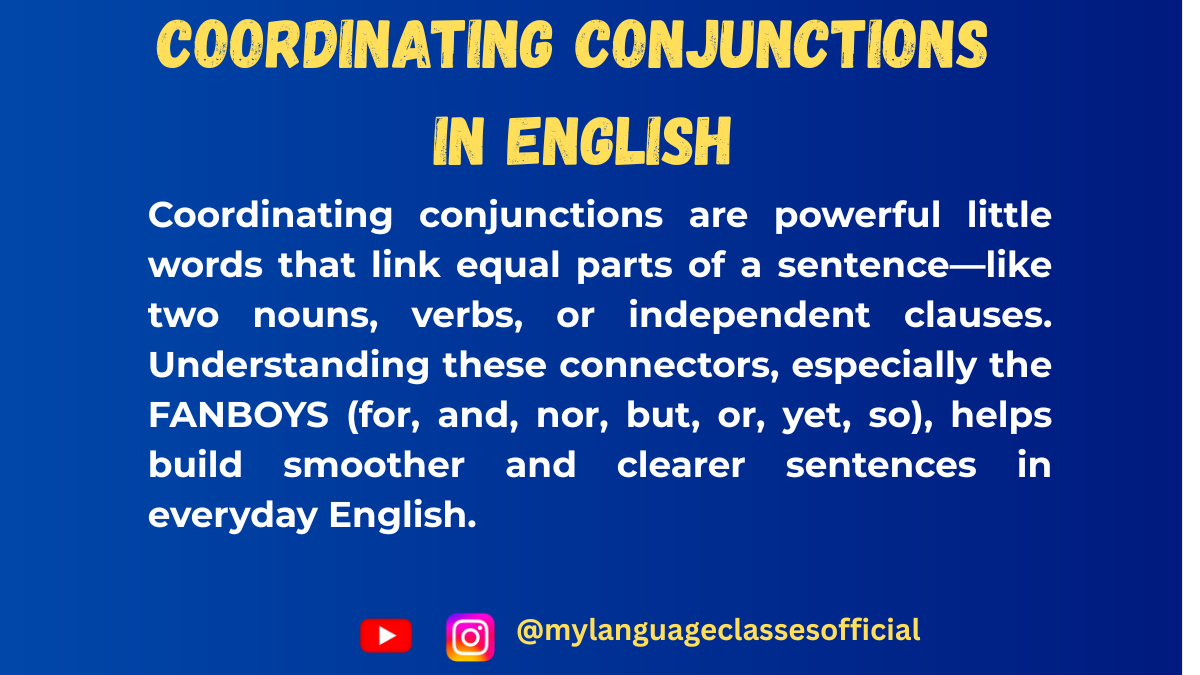
Coordinating Conjunctions in English
Coordinating conjunctions are the glue that holds sentences together. They connect words, phrases, and clauses of equal importance, making your writing and speech more fluid and coherent. Whether you’re a native English speaker or a learner, understanding how to use coordinating conjunctions effectively is essential for clear communication.
In this blog post, we’ll explore the usage of coordinating conjunctions in every possible situation, provide examples, and even test your knowledge with fill-in-the-blank exercises.
What Are Coordinating Conjunctions?
Coordinating conjunctions are words that join two or more elements of equal grammatical rank. The most common coordinating conjunctions are FANBOYS: For, And, Nor, But, Or, Yet, So. These conjunctions are used to connect words, phrases, or independent clauses.
When and How to Use Coordinating Conjunctions
Coordinating conjunctions are used in various situations to connect ideas, show relationships, and create smooth transitions in sentences. Below is a list of situations where each coordinating conjunction is used:
- For:
- Used to indicate reason or cause.
- Example: She stayed home, for she was feeling ill.
- And:
- Used to add information or join similar ideas.
- Example: I love tea, and I enjoy coffee.
- Nor:
- Used to add a negative idea or join two negative clauses.
- Example: He doesn’t like apples, nor does he like pears.
- But:
- Used to show contrast or opposition between ideas.
- Example: I wanted to go, but it started raining.
- Or:
- Used to present alternatives or choices.
- Example: Would you like tea or coffee?
- Yet:
- Used to show contrast or introduce an unexpected result.
- Example: She’s young, yet she’s very wise.
- So:
- Used to indicate a result or consequence.
- Example: It was raining, so we stayed indoors.
List of Coordinating Conjunctions with Examples
Here’s a table of all the coordinating conjunctions along with two example sentences for each:
Conjunction Usage Example 1 Example 2 For Indicates reason or cause She stayed home, for she was feeling ill. He bought flowers, for it was her birthday. And Adds information I love tea, and I enjoy coffee. She sings, and she dances beautifully. Nor Adds a negative idea He doesn’t like apples, nor does he like pears. She didn’t call, nor did she text. But Shows contrast I wanted to go, but it started raining. He’s smart, but he’s lazy. Or Presents alternatives Would you like tea or coffee? You can stay here, or you can leave. Yet Shows contrast or exception She’s young, yet she’s very wise. He’s rich, yet he’s unhappy. So Indicates result or consequence It was raining, so we stayed indoors. She studied hard, so she passed the exam.
More Example Sentences
Here are 10 additional examples to help you understand how coordinating conjunctions work in different contexts:
- I wanted to go to the park, but it was too crowded.
- She didn’t like the movie, nor did her friends.
- You can have cake, or you can have ice cream.
- He’s not only intelligent, but also very kind.
- She was tired, yet she continued working.
- I love pizza, and I love pasta.
- He didn’t study, so he failed the test.
- She bought a new dress, for she had a party to attend.
- They didn’t call, nor did they send a message.
- He’s allergic to cats, yet he adopted one.
Fill-in-the-Blanks Questions
Test your knowledge with these 10 fill-in-the-blank questions. Choose the correct coordinating conjunction from the list: For, And, Nor, But, Or, Yet, So.
- She wanted to go to the beach, _____ it started raining.
- He didn’t like the soup, _____ did he eat the bread.
- You can take the bus, _____ you can walk to the station.
- She was tired, _____ she finished her homework.
- I love reading books, _____ I enjoy watching movies.
- He didn’t study for the test, _____ he failed.
- She bought a new car, _____ her old one broke down.
- He’s not only a great singer, _____ also a talented dancer.
- Would you like tea, _____ would you prefer coffee?
- She’s very busy, _____ she always makes time for her family.
Answers to Fill-in-the-Blanks
- but
- nor
- or
- yet
- and
- so
- for
- but
- or
- yet
Things to Keep in Mind
- Equal Importance: Coordinating conjunctions connect elements of equal grammatical rank (e.g., two nouns, two phrases, or two independent clauses).
- Comma Usage: Use a comma before a coordinating conjunction when joining two independent clauses.
- Example: I wanted to go, but it was too late.
- Avoid Overuse: Don’t overuse coordinating conjunctions, as it can make your writing repetitive.
- Gender Neutrality: Coordinating conjunctions are gender-neutral and can be used in any context.
- Articles: Articles (a, an, the) are not affected by coordinating conjunctions. Use them as needed.
- Example: She bought a book and a pen.
Conclusion
Coordinating conjunctions are a fundamental part of English grammar. They help you connect ideas, present alternatives, and show relationships between words, phrases, and clauses. By mastering the use of FANBOYS, you can improve your writing and speaking skills significantly. Remember to practice regularly and pay attention to the nuances of each conjunction.
If you enjoyed this lesson, be sure to check out more posts like this on my blog at My Language Classes. Don’t forget to subscribe my YouTube channel and follow me on Instagram for the latest language learning tips and lessons. Leave a comment below to share your thoughts, or ask any questions you have about nouns.
Happy learning! 😊
- For:
-
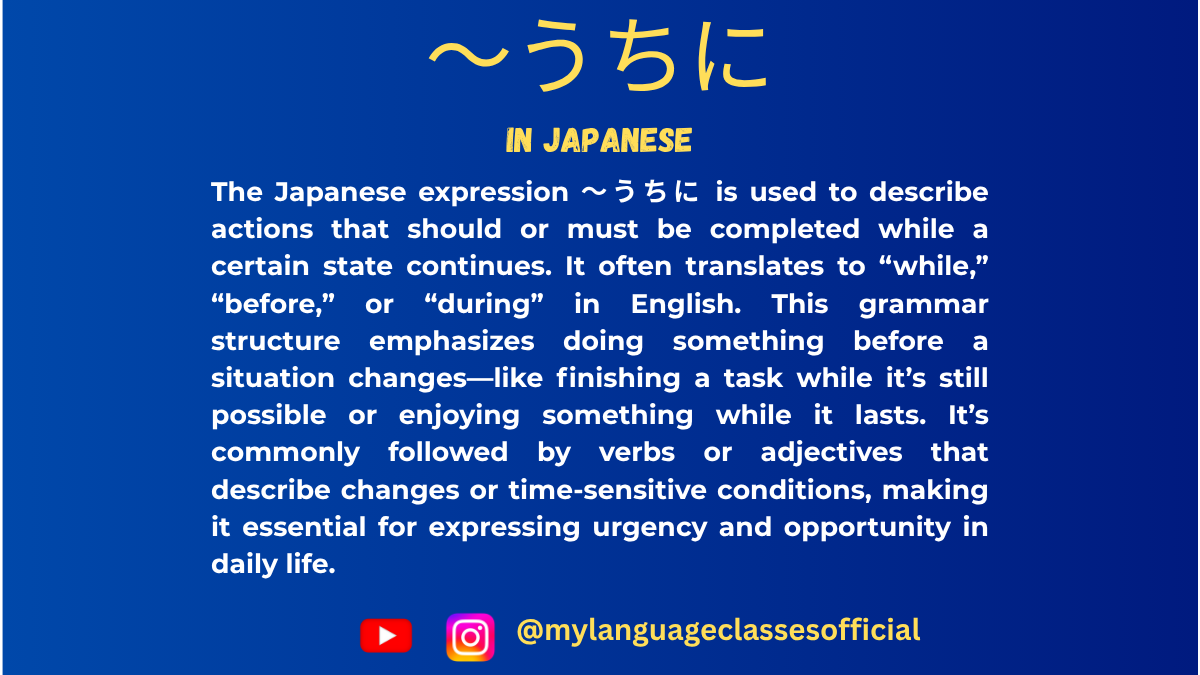
Mastering 〜うちに in Japanese | My Language Classes
Mastering 〜うちに in Japanese
In Japanese, the phrase 〜うちに (〜uchi ni) is a versatile and commonly used grammatical structure that conveys the idea of doing something “while” or “before” a certain condition changes. It is often used to express the urgency of taking advantage of a current situation before it ends or changes. For example, it can mean “while it’s still hot,” “before it gets dark,” or “while I’m young.” Understanding 〜うちに is essential for expressing timely actions and making your Japanese sound more natural.
In this blog post, we’ll break down the formation, usage, and nuances of 〜うちに, provide plenty of examples, and even include practice questions to help you master this useful structure.
Formation of 〜うちに
The formation of 〜うちに depends on the type of word it follows: verbs, nouns, or adjectives. Let’s explore each one.
1. With Verbs
- Verb (Dictionary Form) + うちに: Used to express doing something while or before the action of the verb changes.
- Example: 食べる (taberu) → 食べるうちに (taberu uchi ni)
- Verb (Negative Form) + うちに: Used to express doing something before the action of the verb happens.
- Example: 食べない (tabenai) → 食べないうちに (tabenai uchi ni)
2. With Nouns
- Noun + の + うちに: Used to express doing something while or before the state of the noun changes.
- Example: 夏 (natsu) → 夏のうちに (natsu no uchi ni)
3. With Adjectives
- い-Adjective + うちに: Used to express doing something while or before the state of the adjective changes.
- Example: 若い (wakai) → 若いうちに (wakai uchi ni)
- な-Adjective + な + うちに: Used similarly to い-adjectives.
- Example: 元気 (genki) → 元気なうちに (genki na uchi ni)
Usage of 〜うちに
The 〜うちに structure is used in various situations to emphasize the timing of an action. Here are some common scenarios:
- Before a condition changes:
- Example: 暗くならないうちに帰りましょう。
(Let’s go home before it gets dark.)
- Example: 暗くならないうちに帰りましょう。
- While a state or condition lasts:
- Example: 熱いうちに食べてください。
(Please eat it while it’s still hot.)
- Example: 熱いうちに食べてください。
- Taking advantage of an opportunity:
- Example: 暇なうちに勉強しましょう。
(Let’s study while we have free time.)
- Example: 暇なうちに勉強しましょう。
- Before a natural progression occurs:
- Example: 忘れないうちにメモを取ってください。
(Please take notes before you forget.)
- Example: 忘れないうちにメモを取ってください。
List of Verbs, Nouns, and Adjectives with 〜うちに Form
Here’s a table with examples of verbs, nouns, and adjectives in their 〜うちに form, along with example sentences.
Type Word 〜うちに Form Example Sentence Romaji English Meaning Verb 食べる (taberu) 食べるうちに 食べるうちに冷めてしまった。 Taberu uchi ni samete shimatta. It got cold while I was eating. Verb 忘れる (wasureru) 忘れないうちに 忘れないうちにメモを取ってください。 Wasurenai uchi ni memo o totte kudasai. Please take notes before you forget. Noun 夏 (natsu) 夏のうちに 夏のうちに海に行きたい。 Natsu no uchi ni umi ni ikitai. I want to go to the sea while it’s still summer. Noun 雨 (ame) 雨のうちに 雨のうちに家に帰りましょう。 Ame no uchi ni ie ni kaerimashou. Let’s go home before it rains. い-Adjective 若い (wakai) 若いうちに 若いうちにたくさん旅行したい。 Wakai uchi ni takusan ryokou shitai. I want to travel a lot while I’m young. い-Adjective 明るい (akarui) 明るいうちに 明るいうちに写真を撮りましょう。 Akarui uchi ni shashin o torimashou. Let’s take pictures while it’s still bright. な-Adjective 元気 (genki) 元気なうちに 元気なうちに運動しましょう。 Genki na uchi ni undou shimashou. Let’s exercise while we’re still healthy. な-Adjective 静か (shizuka) 静かなうちに 静かなうちに勉強しましょう。 Shizuka na uchi ni benkyou shimashou. Let’s study while it’s still quiet.
More Example Sentences
Here are 10 additional example sentences to help you understand 〜うちに better.
- Verb: 寝ないうちに宿題を終わらせなさい。
(Nenai uchi ni shukudai o owarase nasai.)
Finish your homework before you go to sleep. - Verb: 電車が混雑するうちに席を確保しましょう。
(Densha ga konzatsu suru uchi ni seki o kakuho shimashou.)
Let’s secure a seat before the train gets crowded. - Noun: 冬のうちにスキーに行きたい。
(Fuyu no uchi ni sukii ni ikitai.)
I want to go skiing while it’s still winter. - Noun: 朝のうちに洗濯を済ませましょう。
(Asa no uchi ni sentaku o sumasemashou.)
Let’s finish the laundry while it’s still morning. - い-Adjective: 寒くならないうちにコートを買おう。
(Samuku naranai uchi ni kooto o kaou.)
Let’s buy a coat before it gets cold. - い-Adjective: 楽しいうちにパーティーを楽しみましょう。
(Tanoshii uchi ni paatii o tanoshimimashou.)
Let’s enjoy the party while it’s still fun. - な-Adjective: 自由なうちにやりたいことをやろう。
(Jiyuu na uchi ni yaritai koto o yarou.)
Let’s do what we want while we’re still free. - な-Adjective: 簡単なうちにこの問題を解いてください。
(Kantan na uchi ni kono mondai o toite kudasai.)
Please solve this problem while it’s still easy. - Verb: 雨が降らないうちに洗濯物を干しましょう。
(Ame ga furanai uchi ni sentakumono o hoshimashou.)
Let’s hang the laundry before it rains. - Verb: 忘れないうちに彼に電話をかけよう。
(Wasurenai uchi ni kare ni denwa o kakeyou.)
Let’s call him before we forget.
Things to Keep in Mind
- Temporal Urgency: 〜うちに emphasizes the urgency of acting before a condition changes. It’s not just about timing but also about taking advantage of the current state.
- Negative Form: When using the negative form of a verb, it often implies “before” something happens. For example, 忘れないうちに (wasurenai uchi ni) means “before I forget.”
- Natural Progression: 〜うちに is often used with natural progressions like aging, weather changes, or fading memories.
- Avoid Overuse: While 〜うちに is useful, overusing it can make your speech sound unnatural. Use it when the timing is genuinely important.
Fill in the Blanks
- 熱い( )にスープを飲んでください。
- 忘れない( )にメモを取ってください。
- 夏の( )に旅行に行きたい。
- 若い( )にたくさん勉強しましょう。
- 雨が降らない( )に洗濯物を干しましょう。
- 明るい( )に写真を撮りましょう。
- 元気な( )に運動しましょう。
- 電車が混雑する( )に席を確保しましょう。
- 自由な( )にやりたいことをやろう。
- 簡単な( )にこの問題を解いてください。
Answers:
- うち
- うち
- うち
- うち
- うち
- うち
- うち
- うち
- うち
- うち
Conclusion
Mastering 〜うちに is a great way to add nuance and naturalness to your Japanese. Whether you’re talking about taking advantage of a situation, acting before a condition changes, or simply emphasizing timing, this structure is incredibly useful. Practice using it in various contexts, and soon it’ll become second nature. Keep studying, and don’t forget to enjoy the process while you’re at it!
Happy learning!
Let me know if you need further clarification or additional examples! 😊
If you enjoyed this lesson, be sure to check out more posts like this on my blog at My Language Classes. Don’t forget to subscribe my YouTube channel and follow me on Instagram for the latest language learning tips and lessons. Leave a comment below to share your thoughts, or ask any questions you have about nouns.
Happy learning! 😊
- Verb (Dictionary Form) + うちに: Used to express doing something while or before the action of the verb changes.
-
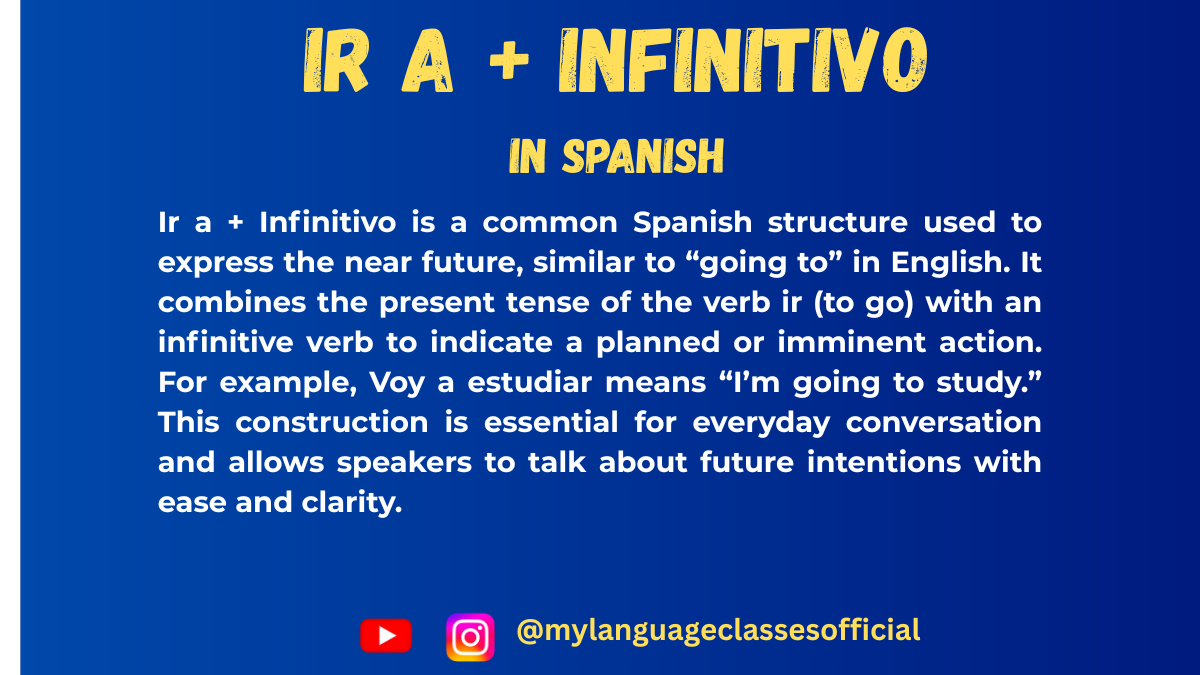
Mastering “Ir a + Infinitivo” in Spanish
In Spanish, the structure “Ir a + infinitivo” is one of the most commonly used grammatical constructions to express future actions or intentions. It is the equivalent of saying “going to + verb” in English. For example, “Voy a comer” translates to “I am going to eat.” This structure is straightforward, versatile, and essential for everyday communication in Spanish. Whether you’re planning to travel, make plans with friends, or simply talk about your future goals, mastering “Ir a + infinitivo” is a must.
In this blog post, we’ll break down everything you need to know about this structure, including common expressions, conjugation rules, irregular verbs, and practical examples. Let’s dive in!
Common Expressions Using “Ir a + Infinitivo”
Here’s a list of common expressions using “Ir a + infinitivo” that you’ll hear in day-to-day conversations:
- Voy a comer – I am going to eat.
- Vamos a bailar – We are going to dance.
- Va a llover – It is going to rain.
- Vas a estudiar – You are going to study.
- Van a viajar – They are going to travel.
- Voy a trabajar – I am going to work.
- Vamos a cenar – We are going to have dinner.
- Va a llegar tarde – He/She is going to arrive late.
- Vas a ganar – You are going to win.
- Van a comprar – They are going to buy.
These expressions are used frequently in Spanish, making them essential for learners to practice and memorize.
Things to Keep in Mind
When using “Ir a + infinitivo,” there are a few key points to remember:
- Articles and Gender: Unlike nouns, infinitives (the base form of verbs) do not require articles or change according to gender. For example, “Voy a leer” (I am going to read) remains the same regardless of the speaker’s gender.
- Plurality: The verb “ir” conjugates based on the subject, but the infinitive remains unchanged. For example, “Voy a correr” (I am going to run) vs. “Vamos a correr” (We are going to run).
- Contractions: In Spanish, “a” (to) and “el” (the) combine to form “al.” For example, “Voy al parque” (I am going to the park). However, this contraction does not apply to infinitives.
- Pronunciation: The “a” in “Ir a + infinitivo” is pronounced softly, almost blending with the infinitive.
When to Use “Ir a + Infinitivo”
The structure “Ir a + infinitivo” is used in the following situations:
- Future Plans: To talk about future actions or plans.
- Example: Voy a visitar a mi abuela mañana. (I am going to visit my grandmother tomorrow.)
- Predictions: To make predictions based on current evidence.
- Example: Va a llover esta tarde. (It is going to rain this afternoon.)
- Intentions: To express intentions or goals.
- Example: Voy a aprender español este año. (I am going to learn Spanish this year.)
- Immediate Future: To describe actions that will happen soon.
- Example: Vamos a salir en cinco minutos. (We are going to leave in five minutes.)
Conjugation
To form “Ir a + infinitivo,” you need to conjugate the verb “ir” (to go) according to the subject, followed by “a” and the infinitive of the main verb. Here’s how to conjugate “ir” in the present tense:
Pronoun Conjugation of “Ir” Yo Voy Tú Vas Él/Ella/Usted Va Nosotros/Nosotras Vamos Vosotros/Vosotras Vais Ellos/Ellas/Ustedes Van Regular Verbs
Regular verbs in Spanish fall into three categories based on their infinitive endings: -ar, -er, and -ir. Here’s how “Ir a + infinitivo” works with each category:
- -AR Verbs:
- Example: Voy a hablar. (I am going to speak.)
- -ER Verbs:
- Example: Vas a comer. (You are going to eat.)
- -IR Verbs:
- Example: Va a vivir. (He/She is going to live.)
Irregular Verbs
Irregular verbs do not follow the standard conjugation patterns, but their infinitives remain unchanged when used with “Ir a + infinitivo.” Here are some common irregular verbs and their conjugations:
- Hacer (to do/make):
- Voy a hacer la tarea. (I am going to do the homework.)
- Tener (to have):
- Vas a tener suerte. (You are going to have luck.)
- Decir (to say/tell):
- Va a decir la verdad. (He/She is going to tell the truth.)
- Venir (to come):
- Vamos a venir tarde. (We are going to come late.)
- Poner (to put):
- Van a poner la mesa. (They are going to set the table.)
Verbs in “Ir a + Infinitivo”
Verb (Infinitive) “Ir a + Infinitivo” Form Example Sentence 1 Example Sentence 2 Hablar (to speak) Voy a hablar Voy a hablar con él. (I am going to speak with him.) Vas a hablar en público. (You are going to speak in public.) Comer (to eat) Vamos a comer Vamos a comer pizza. (We are going to eat pizza.) Va a comer temprano. (He/She is going to eat early.) Vivir (to live) Van a vivir Van a vivir en España. (They are going to live in Spain.) Voy a vivir solo. (I am going to live alone.) Hacer (to do/make) Vas a hacer Vas a hacer ejercicio. (You are going to exercise.) Voy a hacer un pastel. (I am going to make a cake.) Tener (to have) Va a tener Va a tener una fiesta. (He/She is going to have a party.) Vamos a tener un examen. (We are going to have an exam.) Decir (to say) Voy a decir Voy a decir la verdad. (I am going to tell the truth.) Vas a decir algo importante. (You are going to say something important.) Venir (to come) Vamos a venir Vamos a venir mañana. (We are going to come tomorrow.) Va a venir tarde. (He/She is going to come late.) Poner (to put) Van a poner Van a poner la mesa. (They are going to set the table.) Voy a poner música. (I am going to put on music.) Salir (to leave) Vas a salir Vas a salir temprano. (You are going to leave early.) Voy a salir con amigos. (I am going to go out with friends.) Ver (to see) Va a ver Va a ver una película. (He/She is going to watch a movie.) Vamos a ver el partido. (We are going to watch the game.)
More Example Sentences
- Voy a estudiar para el examen. (I am going to study for the exam.)
- Vas a comprar un regalo. (You are going to buy a gift.)
- Va a escribir una carta. (He/She is going to write a letter.)
- Vamos a viajar a México. (We are going to travel to Mexico.)
- Van a jugar fútbol. (They are going to play soccer.)
- Voy a cocinar la cena. (I am going to cook dinner.)
- Vas a aprender español. (You are going to learn Spanish.)
- Va a llover esta noche. (It is going to rain tonight.)
- Vamos a bailar en la fiesta. (We are going to dance at the party.)
- Van a construir una casa. (They are going to build a house.)
Fill in the Blanks
- Voy a ___ (eat) pizza.
- Vamos a ___ (study) juntos.
- Va a ___ (rain) mañana.
- Vas a ___ (buy) un coche.
- Van a ___ (travel) a Europa.
- Voy a ___ (do) ejercicio.
- Vamos a ___ (have dinner) en un restaurante.
- Va a ___ (write) un libro.
- Vas a ___ (learn) español.
- Van a ___ (build) una casa.
Answers:
- comer
- estudiar
- llover
- comprar
- viajar
- hacer
- cenar
- escribir
- aprender
- construir
Conclusion
Mastering “Ir a + infinitivo” is a game-changer for anyone learning Spanish. It’s a simple yet powerful structure that allows you to express future plans, intentions, and predictions with ease. By practicing the conjugations, memorizing common expressions, and using the examples provided, you’ll be well on your way to sounding like a native speaker.
So, what are you waiting for? ¡Vamos a practicar! (Let’s practice!)
¡Hasta luego! (See you later!)
If you enjoyed this lesson, be sure to check out more posts like this on my blog at My Language Classes. Don’t forget to subscribe my YouTube channel and follow me on Instagram for the latest language learning tips and lessons. Leave a comment below to share your thoughts, or ask any questions you have about nouns.
Happy learning! 😊
- 100 Spanish Example Sentences
- 100 Spanish Fill-in-the-Blanks Exercises
- 100 Spanish Vocabulary Lists
- Spanish – Advanced
- Spanish – Beginner
- Spanish – Intermediate
-
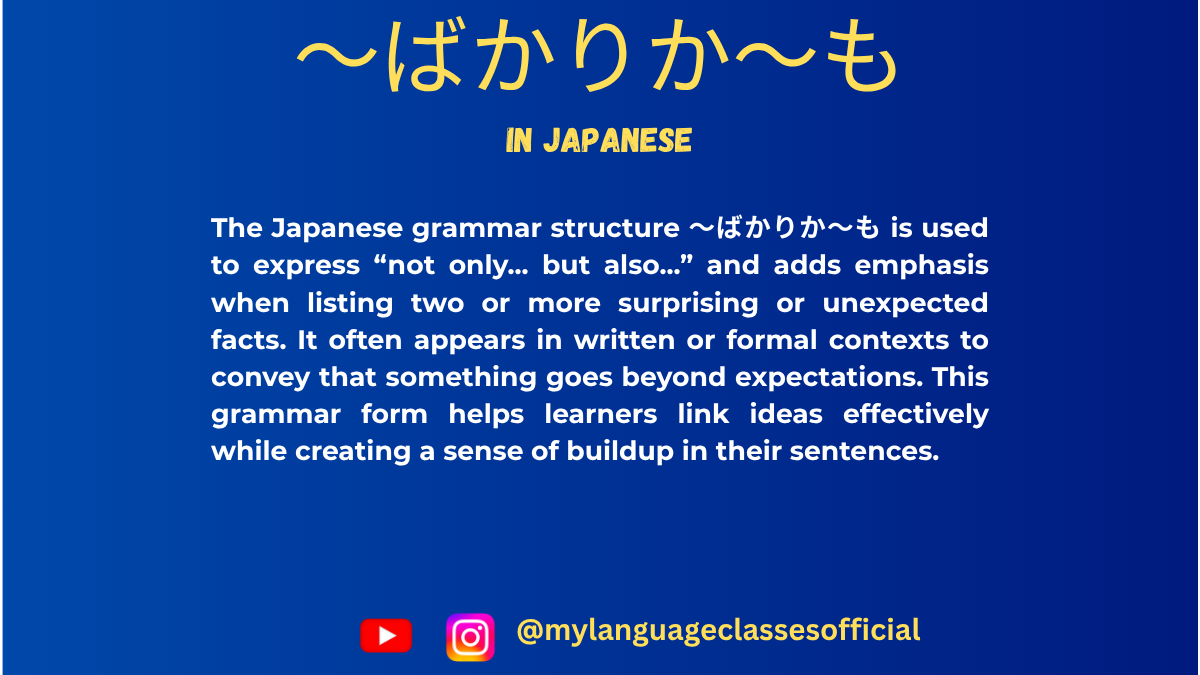
Using 〜ばかりか〜も in Japanese | My Language Classes
Mastering the Japanese Grammar Point: 〜ばかりか〜も
When learning Japanese, one of the most fascinating aspects is discovering how the language expresses complex ideas with seemingly simple structures. One such structure is 〜ばかりか〜も, a grammar point that allows speakers to emphasize not just one thing, but an additional, often surprising or unexpected, element. In English, this can be roughly translated as “not only… but also…” or “not just… but even…”. It’s a powerful way to add depth and nuance to your sentences, making your Japanese sound more natural and sophisticated.
In this blog post, we’ll dive deep into the formation, usage, and nuances of 〜ばかりか〜も. By the end, you’ll have a solid understanding of how to use this grammar point in various contexts, along with plenty of examples to guide you.
Formation of 〜ばかりか〜も
The structure 〜ばかりか〜も is used to connect two clauses, where the first clause introduces something expected or known, and the second clause adds something unexpected or surprising. It can be used with verbs, nouns, and adjectives. Let’s break down the formation for each:
1. With Verbs
- Verb (plain form) + ばかりか + も
- Example: 食べる (to eat) → 食べるばかりか、も…
2. With Nouns
- Noun + ばかりか + も
- Example: 学生 (student) → 学生ばかりか、も…
3. With Adjectives
- い-Adjective (plain form) + ばかりか + も
- Example: 高い (expensive) → 高いばかりか、も…
- な-Adjective (plain form) + ばかりか + も
- Example: 静か (quiet) → 静かなばかりか、も…
Usage of 〜ばかりか〜も
The 〜ばかりか〜も structure is used to emphasize that something goes beyond what is expected. It often carries a tone of surprise or emphasis, and it’s commonly used in both written and spoken Japanese. Here are some situations where you might use it:
- To emphasize an unexpected addition:
- “Not only did he forget my birthday, but he also didn’t even apologize.”
- To highlight a contrast:
- “Not only is she smart, but she’s also incredibly kind.”
- To express exaggeration or surprise:
- “Not only did it rain, but it even snowed!”
- To list multiple negative outcomes:
- “Not only did I lose my wallet, but I also missed my train.”
List of Verbs, Nouns, and Adjectives with 〜ばかりか〜も
Here’s a table with examples of 〜ばかりか〜も used with verbs, nouns, and adjectives:
Type Word Example Sentence Romaji English Meaning Verb 食べる (to eat) 彼はケーキを食べるばかりか、アイスクリームも食べた。 Kare wa keeki o taberu bakari ka, aisu kuriimu mo tabeta. Not only did he eat cake, but he also ate ice cream. Verb 行く (to go) 彼女は公園に行くばかりか、映画館にも行った。 Kanojo wa kouen ni iku bakari ka, eigakan ni mo itta. Not only did she go to the park, but she also went to the movie theater. Noun 学生 (student) 彼は学生ばかりか、先生もしている。 Kare wa gakusei bakari ka, sensei mo shite iru. Not only is he a student, but he’s also a teacher. Noun 雨 (rain) 今日は雨ばかりか、雪も降っている。 Kyou wa ame bakari ka, yuki mo futte iru. Not only is it raining today, but it’s also snowing. い-Adjective 高い (expensive) このレストランは高いばかりか、サービスも悪い。 Kono resutoran wa takai bakari ka, saabisu mo warui. Not only is this restaurant expensive, but the service is also bad. い-Adjective 暑い (hot) 夏は暑いばかりか、湿度も高い。 Natsu wa atsui bakari ka, shitsudo mo takai. Not only is summer hot, but the humidity is also high. な-Adjective 静か (quiet) この町は静かなばかりか、安全でもある。 Kono machi wa shizuka na bakari ka, anzen demo aru. Not only is this town quiet, but it’s also safe. な-Adjective 便利 (convenient) このアプリは便利なばかりか、無料でもある。 Kono apuri wa benri na bakari ka, muryou demo aru. Not only is this app convenient, but it’s also free.
More Example Sentences
Here are 10 more examples of 〜ばかりか〜も in action:
- 彼は遅刻するばかりか、宿題も忘れた。
Kare wa chikoku suru bakari ka, shukudai mo wasureta.
Not only was he late, but he also forgot his homework. - この本は面白いばかりか、ためにもなる。
Kono hon wa omoshiroi bakari ka, tame ni mo naru.
Not only is this book interesting, but it’s also helpful. - 彼女は歌が上手なばかりか、ダンスも得意だ。
Kanojo wa uta ga jouzu na bakari ka, dansu mo tokui da.
Not only is she good at singing, but she’s also great at dancing. - この車は速いばかりか、燃費もいい。
Kono kuruma wa hayai bakari ka, nenpi mo ii.
Not only is this car fast, but it’s also fuel-efficient. - 彼は日本語が話せるばかりか、フランス語も話せる。
Kare wa nihongo ga hanaseru bakari ka, furansugo mo hanaseru.
Not only can he speak Japanese, but he can also speak French. - このホテルは綺麗なばかりか、サービスも素晴らしい。
Kono hoteru wa kirei na bakari ka, saabisu mo subarashii.
Not only is this hotel beautiful, but the service is also excellent. - 彼は宿題をしないばかりか、授業もサボった。
Kare wa shukudai o shinai bakari ka, jugyou mo sabotta.
Not only did he not do his homework, but he also skipped class. - この料理は美味しいばかりか、見た目も素敵だ。
Kono ryouri wa oishii bakari ka, mitame mo suteki da.
Not only is this dish delicious, but it also looks amazing. - 彼は仕事が忙しいばかりか、家事もやらなければならない。
Kare wa shigoto ga isogashii bakari ka, kaji mo yaranakereba naranai.
Not only is he busy with work, but he also has to do housework. - この映画は感動的ばかりか、音楽も素晴らしい。
Kono eiga wa kandouteki bakari ka, ongaku mo subarashii.
Not only is this movie moving, but the music is also wonderful.
Things to Keep in Mind
- Tone: The structure often carries a tone of surprise or emphasis, so use it when you want to highlight something unexpected.
- Formality: It’s more common in written Japanese or formal speech. In casual conversation, you might hear 〜だけでなく〜も more often.
- Word Order: The second clause (after も) should logically follow the first clause.
- Avoid Overuse: Like any advanced grammar point, overusing it can make your speech or writing sound unnatural.
Fill in the Blanks Questions
- 彼は勉強しないばかりか、__________もサボった。
- このレストランは美味しいばかりか、__________も安い。
- 彼女はピアノが上手なばかりか、__________も得意だ。
- この本は面白いばかりか、__________にもなる。
- 今日は雨が降るばかりか、__________も降っている。
- 彼は日本語が話せるばかりか、__________も話せる。
- この町は静かなばかりか、__________でもある。
- 彼は仕事が忙しいばかりか、__________もやらなければならない。
- この映画は感動的ばかりか、__________も素晴らしい。
- この車は速いばかりか、__________もいい。
Answers
- 授業
- 値段
- ダンス
- ため
- 雪
- フランス語
- 安全
- 家事
- 音楽
- 燃費
Conclusion
The 〜ばかりか〜も structure is a versatile and powerful tool in Japanese that allows you to express not only the expected but also the unexpected. Whether you’re emphasizing a surprising addition, contrasting two ideas, or simply adding depth to your sentences, this grammar point is invaluable. With the examples and explanations provided in this blog, you’re now equipped to use 〜ばかりか〜も confidently in your own Japanese conversations and writing. Keep practicing, and soon it’ll become second nature!
If you enjoyed this lesson, be sure to check out more posts like this on my blog at My Language Classes. Don’t forget to subscribe my YouTube channel and follow me on Instagram for the latest language learning tips and lessons. Leave a comment below to share your thoughts, or ask any questions you have about nouns.
Happy learning! 😊
- Verb (plain form) + ばかりか + も

